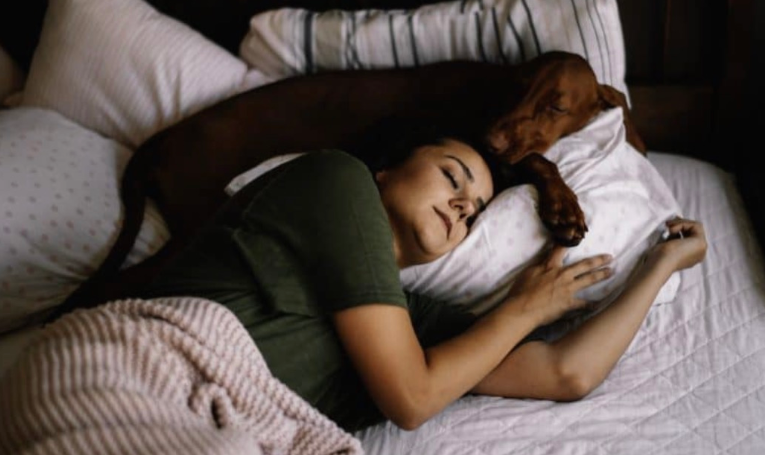
Undoubtedly, the importance of a good night’s sleep for overall health is widely acknowledged. With numerous studies exploring the optimal ways to achieve quality rest, recent research proposes a surprising solution, sharing the bed with dogs. Canisius College in New York State spearheaded this unconventional investigation, revealing that women experience better sleep next to their canine companions compared to human or feline counterparts.
Lead researcher Christy Hoffman, Ph.D., an animal behaviorist, conducted a survey involving nearly a thousand women across the United States to draw these intriguing conclusions. The results unveiled that 55% of participants shared their beds with at least one dog, 31% with a cat, and 57% with a human partner.

Hoffman delved into the reasons behind dogs emerging as superior sleep partners. The study highlighted that dogs’ sleep patterns align more closely with humans than those of cats. Hoffman theorizes that this synchronization may contribute to improved sleep quality, as dogs are adept at accommodating their owners’ sleep schedules, potentially mitigating disruptions caused by differing bedtime routines.
Furthermore, the structured routines imposed by dogs, such as morning walks, assist in regulating their owners’ daily schedules, thereby enhancing overall sleep quality. Another contributing factor is the physical stillness of dogs during sleep, unlike fidgety feline companions. Women in the study reported that dogs tended to remain on the bed throughout the night, fostering a sense of security and stability.
The study’s third crucial finding emphasizes the unique sense of security that dogs provide. Unlike cats or even human partners, dogs offer a heightened level of psychological comfort. Hoffman suggests that the perception of dogs as vigilant protectors, capable of alerting their owners to potential intruders, plays a role in enhancing the sense of security.

Despite these intriguing findings, the study acknowledges the subjectivity of sleep preferences. Factors such as a dog’s snoring or generating excess warmth could pose challenges. Additionally, there are individuals who find solace in the companionship of cats during bedtime.
It’s essential to note that the study relies on participants’ subjective perceptions of their pets’ impact on sleep quality and duration. Consequently, further research is necessary to definitively crown dogs as superior sleeping partners. Hoffman emphasizes the need for continued exploration into the various contexts under which pets positively or negatively influence sleep quality.
As American households increasingly welcome pets, understanding these dynamics becomes crucial. Future research may utilize technologies like Fitbit-like devices to objectively track sleep quality in diverse sleeping conditions, providing a more comprehensive understanding of the intricate relationship between humans and their animal companions during bedtime.
Macaulay Culkin removed his parents from his foundation at age 15: his father disowned him years later

Even though Macaulay Culkin rose to fame as a child, his career took a turn for the worse when his parents divorced and started arguing about who would be in charge of Macaulay Culkin’s wealth and profession.
Macaulay Culkin let a lawyer handle the matter and took his parents’ names out of his foundation trust. His father declared years later that Macaulay Culkin was no longer his son.

On August 26, 1980, Macaulay Carson Culkin was born in New York. He is the son of Patricia Brentrup and former Broadway performer Christopher Cornelius “Kit” Culkin. But his parents have never tied the knot.
The third of seven children is Macaulay. Along with his sister Quinn, he has two brothers who are also actors: Kieran and Rory. At the tender age of four, Macaulay made his stage debut in the musical performance of “Bach Babies.”
As a young age, he started pursuing the performing arts. He trained at Balanchine’s American Ballet School and had several television commercial appearances.
In 1988, he made his screen debut in the drama “Rocket Gibraltar.” The next year, he made appearances in “See You in the Morning” and “Uncle Buck.”
His breakthrough performance was as Kevin McCallister in the comedy “Home Alone” in 1990. Due to the film’s widespread success, Macaulay overnight rose to prominence.
He received nominations for a Golden Globe, an American Comedy Award, and a Young Artist Award for his performance. He returned to the role in the global hit “Home Alone 2: Lost in New York” in 1992.

He starred in multiple popular movies, including “My Girl” (1991), “The Good Son” (1993), and a motion picture adaptation of “The Nutcracker” (1993).
He starred in “Getting Even with Dad,” “The Pagemaster,” and “Richie Rich” the following year. He wanted to lead a regular life after becoming weary of acting after the last movie.
His parents divorced in 1995, sparking a protracted custody dispute that lasted for two years. At this time, Macaulay—who was now the highest-paid child star—made the decision to hold off on accepting any additional jobs until after his parents’ custody battle was resolved.

After being together for more than 20 years, Macaulay’s parents, Kit and Brentrup, separated in 1995 when he was just 14 years old.
His managers were also the actor’s parents. They began bickering after their split over how to raise their kids and handle Macaulay’s rising profession.
Kit and Brentrup received a 15% commission on Macaulay’s profits while overseeing him. Macaulay’s profits were expected to be $50 million by 1990.

Because Kit was allegedly abusive, unfaithful, and had abandoned Macaulay and his siblings, Brentrup petitioned for temporary custody of Macaulay and his siblings in June 1995.
She was worried that Kit’s actions might turn off prospective workers who wished to resume working with their kids. But Kit wanted co-management and joint custody with Brentrup, while Brentrup asked for sole custody.
Kit was accused by the producers of blackmail, extortion, and harassment. He had such a terrible reputation that people referred to him as the “Stage Father from Hell.”
In “The Good Son,” Kit had threatened to cut Macaulay from the follow-up film “Home Alone” unless he was given a significant role. Producers and filmmakers reconsidered hiring Macaulay and his siblings after learning about the controversy involving his father.
Macaulay disclosed that he and his siblings declined to accompany their father throughout the custody dispute. He believed his father to be a pitiful individual.
Macaulay, watching his parents battle in court, acted impartially and decided to take Kit and Brentrup out of his trust fund. He said:
“I found an executor, someone who would handle my finances, and I legally removed my parents’ names from my trust fund.”
He feels that this decision pushed their custody battle to a much quicker conclusion, even though the press has misconstrued it. Take note that in the end, custody went to Brentrup.

Following the protracted struggle, Macaulay’s father—who passed away in January 2014 while preparing dinner—had nothing nice to say about him. He declared:
“I no longer consider him to be a son.”
Following their split, Kit made the decision to relocate to the west with his girlfriend Jeanette Krylowski. In addition, he accepted that he would never see his kids again.

Macaulay’s fatherhood began on April 5, 2021. Dakota Song Culkin is the son he and his fiancée Brenda Song welcomed into their family in Los Angeles.
Dakota, Macaulay’s sister, passed away in an automobile accident on December 9, 2008, at the age of 29. Their son bears her name. On the “Changeland” set in Thailand, Macaulay and Song first got together.
Macaulay announced that he and the former Disney Channel actress were prepared to start a family a year after they first started dating. In 1998, he wed actress Rachel Miner before he began dating Song. In 2002, following two years of separation, they got divorced.

We’ve seen more of Macaulay’s return to the spotlight in recent years. He declared on Twitter in October 2021 that he will not be part of the Disney+ revival of “Home Alone.”
Macaulay wore a colorful costume when she walked the Gucci Love Parade runway in November 2021 on Hollywood Boulevard.
He was dressed in vibrant floral bomber jacket over Hawaiian shirt and wide-leg camel beige slacks. Macaulay flashed his cream-colored Gucci double G leather belt, hands tucked into his pockets.

He accessorized his retro vacation ensemble with caramel-colored, 1970s-style sunglasses and clogs.
Although it’s common for fans to see their idols walk the catwalk, Macaulay surprised them by sharing the podium with Jodie Turner-Smith and Jared Leto.



Leave a Reply